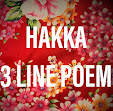Dear Mr. Chanchi Lee,
Thank you so much for your feedback on my Hakka 3 Line Poem approach. Really, I must say that I couldn't thank you enough for having favored us with a chance to get to know so many Hakka elites at a time, at our meeting room in Guan-Si, especially almost all of them speaking the same language with us on Taiwan issue.
I used to say that a group of friends getting together to solve a public issue or a problem is called a culture and a culture is a system of building an identity. Truly, an identity always empowers a group to do something worthwhile for the societies and for the country as well.
I pay my most heartfelt respects for you and your HAPA-NA members who came to join us
with their friends at the 3/23 Gathering in Guan-Si.
Having studied Haiku for about ten years, through correspondence with a Japanese tutor in Tokyo every once a month, I have realized that Japanese Haiku is one of the best literary styles of expression among worldwide genres of literature, compact and concise.
It's a kind of active mental communication with the Nature, with other people and even with yourself through Haiku making in your daily life. The key word is I feel therefore I am. So, my advice is to take notes of what you feel and what you are impressed, any time any where, in Hakkanese as much as possible. That is a Hakka Haiku or, to be exact, a Hakka Senryu (川柳) which is a kind of free style Haiku, less formal in style and rules, no Kigo or Kidai (seasonal subject matter), more synical or sarcastic in nature, more humorous and funny in expression. It's more like our 打油詩 in essence.
Speaking of Master Basho, I used to toy with the idea that if Basho were alive today and provided with a chance to make a round the world trip. See, what would his Haiku album come out to be as his present day " Oku no Hosomizi " . It must be very sentimental and critical of present day ecology and politics.
Return to our subject, I think that our 3 Line poem approach should be a free Haiku form of Senryu, at least at this initial stage of approaching. The essence is what you feel and what you are impressed. I think in Hakka therefore I am a Hakka, at least in the course of making a Hakka 3 Line Poem, even for a very short period of time. This might be a smart way to get yourself familiarized with the Hakkaese language.
Frankly, I am still very new to Hakka 3 Line Poem, just like anyone of you, after all.
I have to buy a Hakkanese dictionary for consultation as soon as possible. Anyway,
let me play a part of ghost buster, if not a pinch hitter for the promotion of Hakka 3 Line Poem, say,拋磚引玉.
清明轉故鄉
山河還是恁親切
總是尋冇好光景
清明掛紙日
山頭花花人陣多
燒香拜祖保家鄉
正月灶頭猛
阿母蒸粄又煎魚
大家轉來鬥鬧熱
選舉年年有
選出人才理眾事
大家心安笑瞇瞇
春來茶來筍
穀雨來前來做茶
師傅做來色味香
六月日頭下
赤膊農家後生介
伯公樹下論大局
客家三行詩
有音有字好作句
煞猛總有出頭天
冇人好借問
客語作詩上天難
還是敢作就贏人 (見笑見笑)
Finally, I thank you so much for your full support of our tentative approach of Hakka 3 Line Poem.
with best regards,
CS Lou 4/11/2010
Sunday, April 11, 2010
Subscribe to:
Post Comments (Atom)

No comments:
Post a Comment